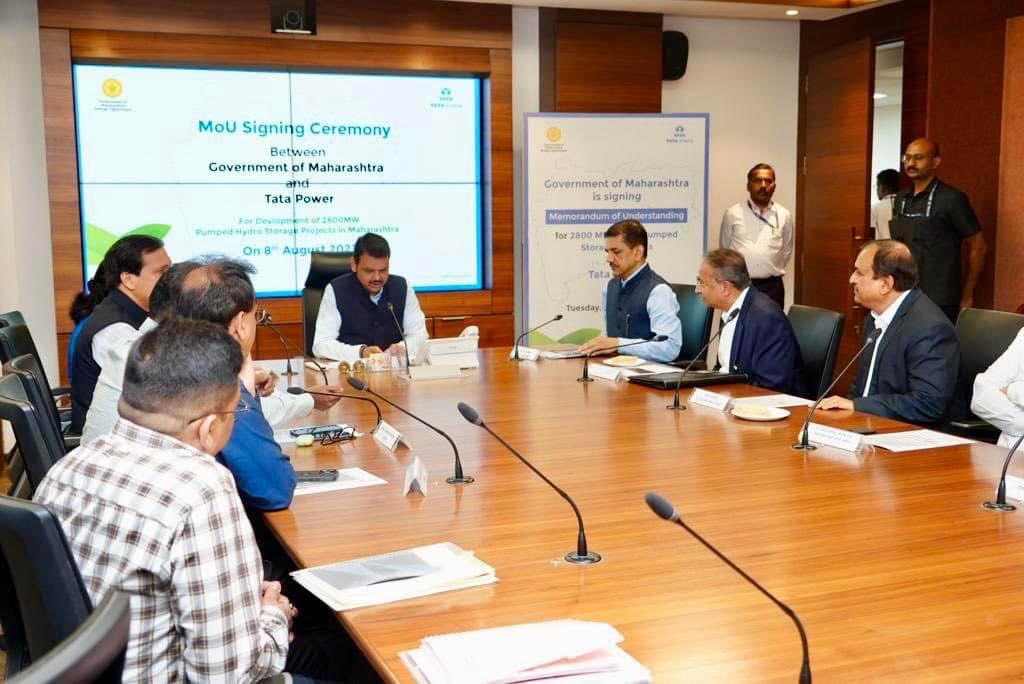Maharashtra has done it again, continuing its winning streak of attracting the highest Foreign Direct Investment (FDI) among all states in the country during the first quarter of the current financial year 2024-25. The state received 52.46 percent of the total FDI in the country during this period. Maharashtra, which fought hard to hold the top spot in attracting foreign investment for the past two years, received Rs 70,795 crore in the first quarter of the 2024-25 financial year when the total investment in the country during this quarter was ₹ 1,34,959 crore. In 2023-24 Maharashtra had received a whopping Rs. 12,35,101 crore FDI, more than Gujarat plus Karnataka combined. Further, Maharashtra had attracted FDI worth ₹ 1,18,422 crore in 2022-23 more than Karnataka, Delhi, and Gujarat combined.
As for major domestic investment, a power plant deal worth Rs. 12,550 crore has been signed with Tata Power in 2023 for building 3 power plants in the state, creating nearly 6000 jobs.
It’s heartening to see Devendra Fadnavis, whose endeavors fructified in making Maharashtra the highest investment recipient consistently during his tenure as the CM of the state, is showing his Midas touch again in his new role as the Dy. CM of the state. It’s a remarkable feat by him, given the fearsome contest by many other states that he had to overcome.
A proactive CM for investment
Earlier, during Fadnavis’s time as Chief Minister, Maharashtra consistently remained the top investment destination state during 2014-19, with an aggregate inflow of Rs. 3.62 lakh crore.
- Within a year of its formation, his government had approved 34 major projects. The total investment was around Rs 20,800 crore. It also generated large-scale employment. The same year, the government signed an agreement with General Motors Company for a project valued at Rs 6,400 crore. Next came a contract of Rs 35,000 crore with Foxconn for a mobile production project in the next five years. Apart from this, Mahindra & Mahindra and Skoda Auto have also expressed their interest in Maharashtra.
- During this period Maharashtra became a preferred location for new defense manufacturing projects. following the central government’s relaxation of defense production policies in 2014.
- In the traditional manufacturing belt in Pune, companies such as Cisco, Daimler, Ericsson, Ferrero SpA, Foton, General Electric, Mars, Modulex, Philips, ThyssenKrupp, Tristone Flowtech, and Volkswagen either made fresh investments or expanded their capacities while the Fadnavis administration was in power. In line with this trend, a large number of Indian companies like Amul, L&T, Mahindra, Sudarshan Chemicals, and Uttam Galva to name a few, also strengthened their presence in Pune. A Chinese company specializing in rolling stock manufacturing, CRRC Corporation, was granted permission to establish a plant for the production of metro coaches in Nagpur. This plant is expected to also manufacture metro coaches for Pune once it receives approval for the project.
- His government encouraged industries to look beyond the already crowded Western Maharashtra area. A new industrial city, Aurangabad Industrial City, was established at Shendra-Bidkin as part of the Delhi-Mumbai Industrial Corridor project.
- An apparel park was established in Amravati, where Raymond and Siyaram were selected as key manufacturers. Several smaller textile parks were also developed across various districts in Marathwada, aimed at utilizing local cotton production through a direct supply chain.
- The Union Ministry of Food Processing Industries had sanctioned 109 projects worth Rs 2,500 crore in the state. The approved projects included 53 cold storage, 18 food laboratories, 8 mini foodparks, and 25 other units. This led to an indirect investment of Rs 10,000 crore in the food processing industry. The government also signed 100 MoUs worth Rs 500 crore in the health and water conservation sectors. Foreign companies including Thales, Turgis Gillard, VR Arrow, and Indomar invested Rs 500 crore in the special economic zone in MIHAN.
- An orange processing plant was established in the Morshi-Warud area, which is recognized as the top orange-producing region in the nation.
- The Sports Authority of India (SAI) was involved in the development of a vast, modern training center and sports complex at Wathoda, located near Nagpur.
- The state also saw significant investments in specialized sectors. A Memorandum of Understanding (MoU) was signed with a company from the United States, Stonetek, to establish a $1 billion urea plant in the Chandrapur tehsil of Bhadravati. Additionally, a Patanjali food park was established in Mihan, Nagpur.
In comparison with the Rs. 6.7 lakh crore investment during the previous Congress-NCP government (2010-14), Fadnavis’s figure of 10.5 lakh crore was 56 percent higher than the previous government.
The go-getter attitude of Fadnavis, akin to entrepreneurship, sends a positive signal to potential investors. His success in pulling investment is also rooted in the development drives, structural reforms, and other steps Fadnavis had taken after becoming the CM of Maharashtra in 2014.
Factors that matter in attracting FDIs and domestic investments
Among many parameters that are considered to evaluate a country or state for investments, the following are the most important ones:
- Skilled labor force
- Infrastructure
- Ease of Doing Business
- Industrial eco-system
Key infra initiatives by the Fadnavis government
When it comes to infrastructure, during the first and second terms of Fadnavis’s tenure in power, Maharashtra has seen over 30 major projects, either completed or in progress, with a projected investment of around US$40 billion. These notable projects include the Navi Mumbai International Airport, Mumbai Coastal Road, Delhi Mumbai Industrial Corridor, Mumbai Trans-Harbour link, Metro projects in Pune, Mumbai, and Nagpur, as well as the Maharashtra Samruddhi Mahamarg. Also, Fadnavis has maintained very good coordination with the central leadership, which provides an extra fillip for investor’s confidence in Maharashtra.
Additionally, the Fadnavis administration launched Maharashtra Industrial Township Limited (MITL). MITL is a Special Purpose Vehicle (SPV) created through a Joint Venture between the National Industrial Corridor Development Corporation Limited (NICDC) and MIDC. It is known as the Aurangabad Industrial City (AURIC) and covers an area of 10,000 acres, set to be developed as India’s first Greenfield Smart Industrial estate.
Ease of Doing Business (EoDB)
The Ease of Doing Business (EoDB) index is a ranking system created by the World Bank. Its main goal is to examine the implementation of every Act, Rule, and Regulation/Compliance to make Government-to-Business and Government-to-Citizen interactions simpler, more logical, and based on digital technology that helps reduce the time and cost involved and enhance the ease of doing business for entrepreneurs and investors. Mumbai needs special focus as the city along with Delhi is considered for the World Bank-led EoDB evaluation for India.
The Fadnavis government took several steps to scale up the investment environment in Maharashtra. For example, Shaktipradan Cell was formed to get all the permissions required to set up the industry within a month. The changes in the state policy were made in line with the changes taking place globally in specific areas. The new IT-enabled Services Policy, 2015 was implemented to promote growth of the IT and ITES sectors. At the same time, a facility was created to make all permissions available at one place through the ‘Maitri’ web portal for investors investing more than Rs 100 crore.
In 2016, the Directorate of Industries introduced Maharashtra Industry, Trade, and Investment “MAITRI” to support and guide investors interested in investing in Maharashtra. The number of different types of permissions required to be obtained from the state to start an industry was reduced from the earlier 67 to just 5 by the Fadnavis government.
The MAITRI platform, which serves as the State Single Window System for the various Government-to-Business (G2B) approvals needed for industrial setup in Maharashtra, has successfully processed more than 290,000 applications to date. Investors have access to 119 services across 15 departments through the MAITRI portal. The Maharashtra Industry, Trade, and Investment Facilitation Act, “MAITRI Act,” came into effect on July 3, 2023, marking a significant step towards making Maharashtra more business-friendly and boosting the state’s position in trade and investment.
Industrial eco-system
Maharashtra boasts over 34 lakh registered MSMEs employing over 1.37 crore people. Significant changes were made in the Factories Act 1948 to promote small-scale industries in the state. The state’s initiatives, focused on women, boosted the number of women involved in setting up MSMEs, with women leading over 19%. The Raising and Accelerating MSME Performance (RAMP) scheme, a central government’s project backed by the World Bank, was implemented to assist over 1,00,000 MSMEs and encourage new MSME initiatives in Maharashtra.
In addition, the state industrial policy was amended in 2019, which identified 14 key sectors for investment priorities. The sectors covered in the report include electric vehicles, artificial intelligence, biotechnology, information technology, textiles, agriculture and food processing units, and electronics among others. At the same time, the Fadnavis government launched the Startup Scheme to encourage new entrepreneurs, which resulted in the registration of 2587 new start-ups in the state.
Skill development
Fadnavis always emphasized the critical need for skill development, advocating for a blend of technical, soft, and managerial skills to meet global standards. With a focus on effective public-private partnerships in creating industry-aligned training programs, his government enthusiastically implemented PM Modi’s Skill India Mission in Maharashtra from 2015 onwards to empower the youth of the state with the necessary skills and knowledge to enhance their employability and entrepreneurship capability. His government also launched the Kaushalya Setu program in 2016, which was aimed at providing skill-oriented training to students after matriculation.

